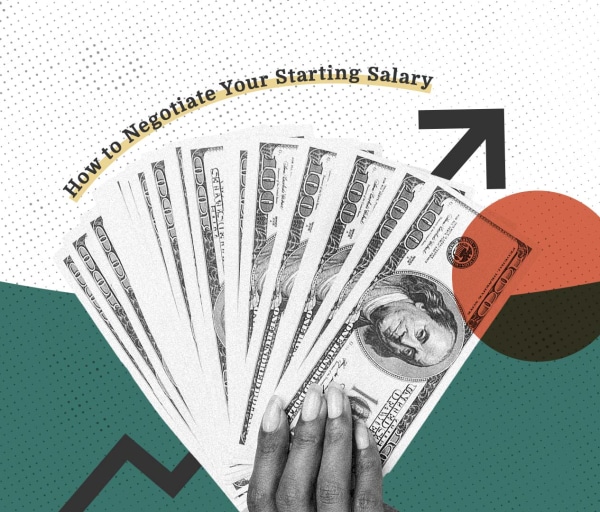thebestschools.org is an advertising-supported site. Featured or trusted partner programs and all school search, finder, or match results are for schools that compensate us. This compensation does not influence our school rankings, resource guides, or other editorially-independent information published on this site.
Are you ready to discover your college program?
Here's a fun fact most job candidates don't know: Hiring managers expect new hires to negotiate their starting salaries. A Salary.com survey found that 84% of employers plan to negotiate on salary — and more than half of employers intentionally offer a low starting salary to leave room for negotiations.
Yet many new hires accept the initial offer without negotiating. A 2019 study found that about half of new employees negotiate — including 68% of men. By contrast, a study from 2020 found that 60% of women had never negotiated their salary.
The cost of not negotiating adds up. According to one estimate, accepting the initial offer could cost you more than a million dollars in lost earnings over the course of your career.
Even over shorter periods of time, a high starting salary can make a big difference. Consider two new hires. One accepts the initial offer of $50,000 per year, while the other negotiates the salary up to $60,000. Over five years, with annual raises of 3%, the employee who negotiated will earn $53,000 more than the employee who did not negotiate.
Accepting an offer without negotiating can cost you. If you're on the job market and need to brush up on your negotiation skills, these salary negotiation tips can help.
Salary Negotiation Strategies
What's the best strategy when it comes to how to negotiate salary?
First, conduct salary research and strategize before the negotiation, so that when you walk in, you're already prepared.
Second, go into your salary negotiations with confidence. Remember that employers expect you to negotiate, so don't let fear keep you from asking for a higher salary.
And finally, act professional and aim high. Selling yourself short this early in the job process could impact your whole career, but negotiations are also a chance to make a strong first impression.
Come Prepared with Salary Research
Before your interview, research salaries in your field. Knowing salary ranges, particularly for your specific field and location, helps you know what your value is on the job market. It can even help you avoid applying for jobs at companies that offer significantly below-average wages.
Where should you research salaries? Start with salary websites like Glassdoor, PayScale, and LinkedIn, which provide salary data broken down by job title, experience, degree, location, and even individual company. However, these sites rely on salary data from users, so they might not provide the full picture.
The U.S. Bureau of Labor Statistics (BLS), a federal agency, offers salary data broken down by field and location. It draws on payroll records filed by businesses, so BLS data offers a more reliable picture of median salaries.
Finally, reaching out to your local network is one of the best ways to research salaries. A mentor at your school, friends working in the industry, or even job recruiters can all offer advice on standard starting salaries in your field and city.
Researching salaries helps new hires avoid the wage gap and make sure they're earning what they're worth.
Practice Negotiating
Along with preparing a resume, doing mock interviews, and reaching out to your network, add practicing your negotiation skills to your job hunt to-do list. When you receive a job offer, you'll be glad you sharpened your negotiation skills.
Here's the good news: Once an employer makes a job offer, you're negotiating from a position of strength. Remember that the vast majority of employers expect salary negotiations after making a job offer. The employer already wants to hire you and they expect you to negotiate.
When negotiating salary, be as clear as possible. Instead of a vague request to increase the base salary, use specific numbers and back up your request with evidence. For example, bring in your experience or salary research to justify the higher number.
During the negotiation process, express your enthusiasm for the position and company. If you have multiple offers, you can use that, too: Ask other employers to match your highest salary offer.
Practicing your negotiation strategies will also increase your confidence. Negotiating can be uncomfortable and your instincts might tell you to simply accept the initial offer. Have a friend role play the hiring manager for you, then practice asking for a higher salary. This will help you feel more comfortable and overcome anxiety about negotiating.
Timing is Everything
When should you negotiate your starting salary? Consider the Goldilocks approach.
Asking too early -- during the interview process, for example -- can be off-putting to hiring managers. On the other hand, asking too late -- after you accept the offer or sign the paperwork -- risks missing the negotiating window.
Instead, plan to negotiate your salary after receiving an offer but before accepting it. If you receive an offer in person or by phone, you don't have to jump directly into the negotiations. In fact, it's a good idea to ask for a few days to review the offer.
If you prefer to plan out your responses, send a salary negotiation email. Be as specific as possible in the email. Ask for the salary you'd like and any additional benefits, like a flexible schedule or more paid time off.
Understand Your Industry
Salaries vary by industry -- and so does the ability to negotiate starting salaries. If a nonprofit organization offers you a position with a starting salary of $35,000 per year, for example, you probably can't negotiate for $70,000 per year. The company doesn't have enough funding for that.
How to negotiate salary depends on the job. In certain fields, starting salaries depend on your experience, degree, and title, with little wiggle room to increase the salary. For instance, federal jobs use pay tables to calculate salaries, as do many public school districts.
However, even in industries with salary tables or limited funding, you should still negotiate. Make an argument for why the employer should move you up a pay grade or offer you a salary at the top of the available range. You can also negotiate paid time off, benefits, and other perks.
Aim High -- Within Reason
How much should you ask for during a salary negotiation? The general advice is to choose a number 10-20% higher than the salary offer.
You should aim high with your counteroffer because it's likely that during the negotiation, you'll probably land on a number between the original offer and your counteroffer. Draw on your salary research to justify why you should receive a higher amount. Bring in specific evidence from your work history, internship experience, or background that makes you an exceptional candidate.
When should you ask for more than 20%? When the initial offer is much lower than the typical salaries for your field. However, keep in mind that an employer who lowballs the starting salary that much might not be willing to increase it -- or to offer good raises down the line. In some cases, it's better to walk away than accept a very low salary.
Think About The Full Package
Salary is only one part of negotiating a job offer. In addition to asking for a higher starting salary, you can also negotiate paid time off, benefits, and a work-from-home schedule. In some industries, a job offer might even include moving funds, a signing bonus, or a start-up fund for buying necessary equipment.
These factors can significantly impact your quality of life on the job. Especially if you're in an industry with less wiggle room on salary, you should negotiate for additional PTO, a flexible schedule, and other changes that will improve your work life.
Know Your Rights in a Negotiation
You have the right to walk away from an unsuccessful salary negotiation -- and so does the employer. But you knew that already. What other rights do you have during a negotiation?
First, hiring managers should not ask certain questions during the interview or negotiation process. This includes questions about your age, disability status, or parental status -- they all violate federal discrimination laws. If an illegal question comes up in the interview, you can choose to disclose that information about yourself, but you can also choose not to answer.
A number of states also have salary history bans. These laws bar employers from asking about your previous salary, and some also ban using salary history to determine a salary offer. Salary history bans help limit compensation discrimination.
It's also important to consider the employer's perspective, as there are things they may be legally prohibited from offering you. For example, they might not be able to offer a 401(k) match without violating IRS nondiscrimination rules. Similarly, it might be impossible for an employer to subsidize your health insurance premiums unless they offer that benefit company-wide.
Celebrating a Successful Salary Negotiation
The negotiation process can take several rounds because hiring managers often need approval to offer certain benefits or increase the salary offer. Budget at least a few days to complete the negotiation process.
But once you've reached an acceptable offer, it's time to sign the paperwork and celebrate. By negotiating a higher starting salary, you've increased every paycheck you'll receive and set yourself up for higher raises in the future.
If you walk away from the salary negotiation disappointed, don't lose hope. You still have opportunities to increase your pay. Plan to ask for a raise after 6-12 months on the job or during your first annual review. Once you've established a good track record with the company, you'll have more evidence to demonstrate why you deserve a raise. And remember: These salary negotiation also apply to arguing for raise.
Don't leave money on the table. Instead, negotiate like a professional.

Genevieve Carlton
Genevieve Carlton holds a Ph.D. in history from Northwestern University. After earning her doctorate in early modern European history, Carlton worked as an assistant professor of history at the University of Louisville, where she developed new courses on the history of science, Renaissance Italy, and the witch trials. Carlton has published five peer-reviewed articles in top presses and a monograph with the University of Chicago Press. She also earned tenure with a unanimous vote before relocating to Seattle. Learn more about Carlton's work at genevievecarlton.com.
Header Image Credit: Prostock-Studio | Getty Images
Popular with our students.
Highly informative resources to keep your education journey on track.
Take the next step toward your future with online learning.
Discover schools with the programs and courses you’re interested in, and start learning today.


